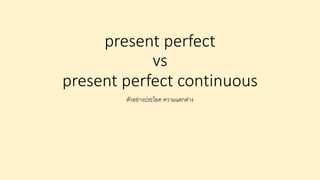Present perfect vs present perfect continuous
•
2 likes•2,255 views
,present perfect ,present perfect continuous ,ความแตกต่าง ,อังกฤษธุรกิจ ,business english
Report
Share
Report
Share
Download to read offline

Recommended
More Related Content
More from Aj Muu
More from Aj Muu (20)
Toeic reading สไลด์ช่วยอ่าน fern lake ommunity เติมคำและเติมความ

Toeic reading สไลด์ช่วยอ่าน fern lake ommunity เติมคำและเติมความ
Toeic reading แบบสามตอน ตัวอย่างโจทย์ เรื่อง bistro คำแปล เฉลย คำอฺธิบาย 

Toeic reading แบบสามตอน ตัวอย่างโจทย์ เรื่อง bistro คำแปล เฉลย คำอฺธิบาย
ศัพท์นิด สำนวนหน่อย (100 items) words & expressions

ศัพท์นิด สำนวนหน่อย (100 items) words & expressions
Time management เคล็ดลับการบริหารเวลา ฝึกอ่าน ประโยค ความเข้าใจ ความหมาย five...

Time management เคล็ดลับการบริหารเวลา ฝึกอ่าน ประโยค ความเข้าใจ ความหมาย five...
So vs such ความแตกต่าง การใช้ ตัวอย่างประโยค ความหมาย

So vs such ความแตกต่าง การใช้ ตัวอย่างประโยค ความหมาย
Questions คำถามแบบต่างๆ yes-no questions, wh-questions, negative questions

Questions คำถามแบบต่างๆ yes-no questions, wh-questions, negative questions
Present perfect vs present perfect continuous
- 1. present perfect vs present perfect continuous ตัวอย่างประโยค ความแตกต่าง
- 2. 1. เปรียบเทียบ ประโยค (a) และ (b) •(a) We've talked about a new project. •(b) we've been talking about a new project. (a) มีนัยยะว่าเลิกอภิปรายกันแล้ว ส่วน (b) เน้นความต่อเนื่องของการ อภิปราย และมีแนวโน้มว่ายังคุยกันต่อไปอีก
- 3. ทานองเดียวกัน •(a) He has written the report. เขียนเสร็จแล้ว •(b) He has been writing the report. ยังเขียนอยู่ •(a) He has worked on several projects for us. ทางานให้เราหลายโครงการแล้ว (เสร็จแล้ว โครงการในอดีต) •(b) He has been working on the latest project since July. ทาโครงการล่าสุดมาตั้งแต่กรกฎาคม(ยังไม่เสร็จ)
- 4. •(a) She has learnt how to use the new software. เรียนจบแล้ว ใช้เป็น •(b) She has been learning how to use the new software for two weeks now. ยังเรียนอยู่ น่าจะเริ่มใช้เป็น บ้างแล้ว แต่ยังมีปัญหาบ้าง
- 5. •2. present perfect continuous ไม่สามารถใช้กับกริยา เช่น know, understand, believe etc. ที่บรรยายถึง สภาวะ หรือ ความเชื่อ ได้ •ให้ใช้ว่า I have known Mr. John Smith for five years. •แต่จะไม่พูดว่า XXXX I have been knowing ... เป็นต้น
- 6. หมายเหตุ: ในบางกรณี กับบางกริยา ความหมายอาจไม่แตกต่างกันนัก •I have worked/have been working here since 2012. •I have lived here/have been living here for ten years. •โดยที่ present perfect continuous tense จะให้ความรู้สึก ถึงการต่อเนื่องและการดาเนินอยู่ต่อไป •ส่วน present perfect tense เน้นสิ่งที่ได้เกิดขึ้นแล้ว ณ ขณะที่พูด และยังดาเนินอยู่เช่นกัน
